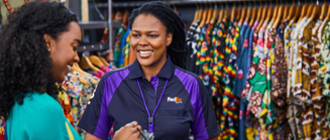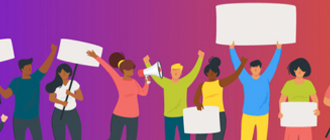
How Equity Drives Transformation In The Logistics Industry
By Kawal Preet | March 8, 2024
Diversity and inclusion are powerful drivers of transformation in the workplace. This International Women’s Day, we explore the link between promoting gender equity and impact on organizational success and innovation, particularly in the world of logistics.
Logistics is an industry undergoing transformation via two major drivers: technology and equity in the workforce. To be successful in creating the smart supply chains of the future, we need to tap all talent, regardless of gender, if we want to get ahead of the pace of global trade.
Advancing gender equality
The logistics sector is traditionally seen as male-dominated, mainly because of the physical tasks of pick-up and delivery, which remain the most visible aspects of what we do. Such perceptions can hold women back from joining the industry, further reinforcing stereotypes throughout society.
The reality is that across all levels of the industry, women are highly visible, even on the frontline. According to a Gartner survey, women make up 41% of the supply chain workforce as of last year.
At FedEx, we have some amazing women couriers and drivers who are debunking popular perceptions. We are also very proud of the fact that in our organization, women in leadership are the norm - not the exception.
What’s more: many of our female leaders have also built their entire career paths here from entry level to the C-suite, and many started in engineering and tech roles.
However, the advancement of equity in the workplace will continue to be something that needs to be consciously managed. The region I oversee is the most diverse in the FedEx network and the notion of gender equality varies greatly in the markets we operate in.
That is why I signed the CEO statement of support for the United Nation Women’s Empowerment Principles (UNWEPs) – Equality Means Business. The commitments we promised under the UNWEP will push us further along the path of advancing gender equality and empowering women in the workplace and community.
We need to build an inclusive workplace culture where women can thrive as much as their male counterparts. In practice, we need to ensure a level playing field both within and outside the organization. It is my commitment to make sure talent, with the potential and desire to learn, have opportunities to advance their careers through internal promotions, job rotations, and cross-functional projects.
Inclusivity fosters innovation and digital transformation
Research shows organizations that promote diversity and cultivate inclusive environments move faster. They drive more innovation and are better at decision-making, performing better overall.
At FedEx, our business sits at the intersection of the physical and digital worlds. Today we are using advanced technologies and data insights to transform our business, making supply chains smarter and less labor intensive.
From digital breakthroughs to AI, these solutions have been created and implemented by our diverse workforce – and many of our innovators are female. As I always say, technology is by definition gender-agnostic.
I started my career at FedEx as an engineer over 20 years ago. Science and technology roles today are light years ahead from when I was young. We encourage all our team members regardless of their gender, age, seniority to adapt to a digital-first mindset and build their capabilities through a learning community setting that empowers them to use automation to solve business issues.
So far, teams have developed 56 new automation products to support their functions and automated 51,000 manual hours. It shows how an inclusive culture creates room for blue sky thinking and creativity is driving business success.
From inspiring inclusion to transformation
International Women’s Day is an important moment for us to put key issues women face under the spotlight. But as leaders in logistics, we need to address these issues 365 days a year. The theme of this year’s IWD 2024, “Inspire Inclusion”, means we must celebrate diversity and empowerment each day.
We know that gender equality cannot be attained by empowering women alone. We must include all genders in the process, which includes strengthening our pool of male allies. McKinsey research shows that over multi-year timeframes, companies with strong women representation are 25% more likely to outperform. That should provide all the incentive we need to build a more inclusive logistics industry.
SHARE THIS STORY
- How To Ship A Giant Panda
- How To Make Freight Shipments Work For Your Small Business
- The Rise Of Intra-Asia Trade: Opportunities In The China-Southeast Asia Corridor
- Southeast Asia's Role In Global Manufacturing Supply Chains
- 8 Most Unusual Shipments In The History Of FedEx
- Where Do Old Planes Go When They Retire?
Sign up now and save on your shipping rates!
Sign up now and earn discounts by shipping instantly with FedEx Ship ManagerTM at fedex.com.
Recommended For You

Women Of FedEx Challenging Bias For The Better
From frontliners to aviation security and pilots, women at FedEx are making an impact across the organization and challenging gender biases.
Read More
How To Build Diversity, Equity, & Inclusion At Your Small Business
Starting a small business? Building a diverse, inclusive workplace culture for all employees and genders is just as important as your market strategy.
Read More
How To Empower More Women In STEM Fields
It’s essential to create more opportunities for girls and women in STEM industries.
Read More

